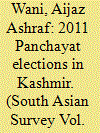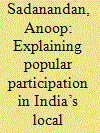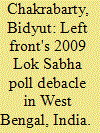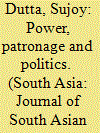| Srl | Item |
| 1 |
ID:
127684


|
|
|
|
|
| Publication |
2011.
|
| Summary/Abstract |
A working democratic set-up provides ample space to mitigate the tensions in a society to a large extent. Unfortunately, democracy could not work in Jammu and Kashmir the way it is expected to work in a free society. Denial of democracy and misgovernance became almost an accepted way of political life in the state, which became one of the main reasons of the rise of militancy in the state. The 2011 panchayat elections provide the best opportunity to restore the confidence of the people in the democratic set-up by empowering the elected representatives in a real sense and bringing more and more people into the democratic setup. It also poses a great challenge to the government as far as fulfilling the democratic aspirations of the common people who have whole heartedly participated in this democratic exercise at the local level.
|
|
|
|
|
|
|
|
|
|
|
|
|
|
|
|
| 2 |
ID:
153413


|
|
|
|
|
| Summary/Abstract |
The 73rd amendment to the Indian Constitution launched an extensive experiment in local democracy. Based on a study of 2,794 gram panchayats and field observations in West Bengal, this article examines when and why popular participation in panchayat elections—the most basic and visible aspect of local democracy—differs across local governments. The study finds that gram panchayats witness high levels of participation when they pursue policies that benefit the villagers, such as greater investment in education, and when they are seemingly less corrupt. Investment in public goods and lower rents are known to promote economic development and general welfare. In addition to these familiar implications, this study shows how these policies also have political consequences for democracy in India.
|
|
|
|
|
|
|
|
|
|
|
|
|
|
|
|
| 3 |
ID:
104107


|
|
|
|
|
| Publication |
2011.
|
| Summary/Abstract |
Left front's 2009 Lok Sabha poll debacle in West Bengal, India
This paper demonstrates that left front is no longer unassailable in West Bengal after three decades of rule. It identifies the specific reasons for the Left front electoral debacle in the 2009 Lok Sabha elections. The paper also argues that the left front is caught between the contrasting imperatives of adapting to changing socioeconomic conditions in liberalizing India, while concurrently attempting to remain true to its traditional communist ideology and support base in a globalized world
|
|
|
|
|
|
|
|
|
|
|
|
|
|
|
|
| 4 |
ID:
114014


|
|
|
|
|
| Publication |
2012.
|
| Summary/Abstract |
This paper conceptualises the culture of corruption and clientelism in panchayat elections in Uttar Pradesh. The discussion is based on a year of field research on the strategies adopted by power-holders to monopolise these local bodies. The study found that patronage, influence and intimidation are used by the dominant factions to retain considerable control over the panchayats. While this in itself is not especially new, the study demonstrates the ways in which government initiatives to ensure greater transparency and representation of marginal groups-lower castes and women, in particular-through reservations continue to be cleverly subverted. A successful pradhan (headman) establishes a network of supporters and alliances, which he nurtures and rewards by brokering and embezzling funds through the institutions that he controls, instead of neutrally devolving funding to the needy sectors of the village.
|
|
|
|
|
|
|
|
|
|
|
|
|
|
|
|